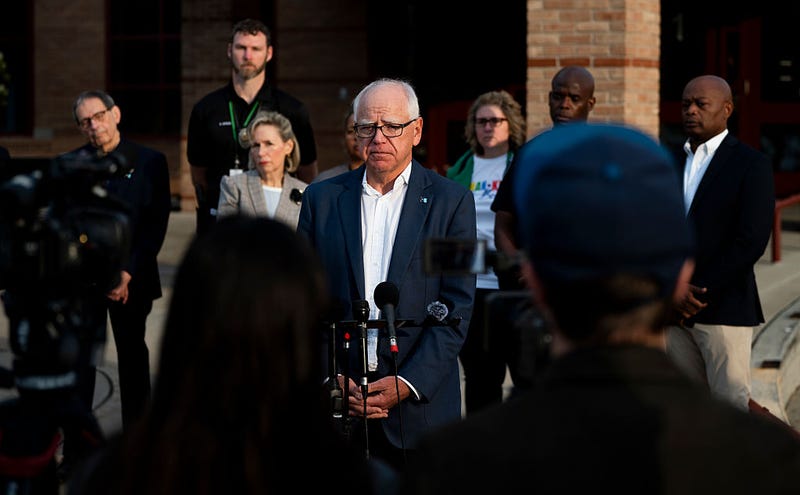
As Minnesota mourned a mass shooting at a church that left two schoolchildren dead and 21 people injured, Gov. Tim Walz promised to call a special session for the Legislature to pass solutions to gun violence and school safety.
But a month after the Aug. 27 shootings, which happened during the first Mass of the academic year at Annunciation Catholic School in Minneapolis, talks seem to have stalled.
Despite impassioned pleas from kids' doctors, parents of victims and from Pope Leo XIV, chances appear remote that lawmakers could agree on enough to justify a special session.
The hard political reality
The Democratic governor is up against a hard political reality: the Minnesota Legislature is too evenly divided to pass anything without bipartisan support.
While there's support for gun restrictions among urban and suburban Democrats, there's opposition among rural and suburban Republicans to any infringement on the Second Amendment right to keep and bear arms. The few rural Democrats find themselves in a difficult position whenever gun issues come up, as they did in 2023 when Democrats used their temporary full control to pass the first gun limits in years.
Mass shootings usually lead to calls for more gun laws
Several Democratic-led states have tried to restrict access to firearms after previous mass shootings. Connecticut enacted some of the country's strongest gun laws after the 2012 shooting at Sandy Hook Elementary, including an assault weapons ban.
But those calls typically fail in Republican-led states, where gun rights supporters say violent people are the root problem. Efforts to tighten Texas' gun laws gained little traction after the 2022 shooting at Robb Elementary in Uvalde.
Tennessee Republican Gov. Bill Lee could not persuade his heavily GOP legislature to approve a “red flag” law after the 2023 shooting at a Nashville school. But Lee did sign legislation in 2024 allowing teachers and staff to carry concealed handguns on school grounds.
Uvalde was a major impetus for a sweeping federal gun bill that President Joe Biden signed in 2022, though it focuses on people, not the weapons.
The fallout from shootings in Minnesota
The shootings at the Church of the Annunciation followed the assassination of the top House Democratic leader, Rep. Melissa Hortman, and her husband, and the shootings of a Democratic state senator and his wife who survived. Those recent attacks have made the issue personal for Walz and many of his fellow Democrats.
Soon after the church shootings, Walz made bans on assault weapons and high-capacity magazines his top priorities for a special session. He reiterated that as he launched his reelection campaign last week. But meetings with legislative leaders, and a pair of recent hearings, have not produced the required consensus.
Parents of some of the wounded children told senators at one hearing that an assault weapons ban might have prevented the tragedy and doing nothing was not an option.
“Undoubtedly, there will be another mass shooting and more kids will die. If you think it won’t hit your community and someone you love, think again. It is up to our lawmakers to decide what type of weapon the next mass shooter is armed with,” testified Malia Kimbrell, whose 9-year-old daughter, Vivian St. Clair, survived being shot three times.
But Walz told reporters Tuesday that Republicans want to talk about everything but guns.
“I was told by a Republican leadership that there would never be a vote on guns — there wouldn’t be a vote on a gun ban," he said. "And that’s not acceptable.”
The governor acknowledged the House is tied 67-67 between Republicans and Democrats, and that the narrow Senate Democratic majority lacks the 34 votes required to pass anything on its own.
Special elections for two open seats in November are expected to restore the Senate to full strength with a 34-33 Democratic majority. But even then, Senate Majority Leader Erin Murphy conceded some GOP support would be needed.
“If the Governor calls a special session, we will work to craft the best possible bill, and our members will decide by voting their conscience and for the districts they represent,” Murphy said in a statement Thursday. “But no bill can pass the House or Senate without GOP votes, and Minnesotans need Republicans to commit to serious solutions.”
Republican House Speaker Lisa Demuth, of Cold Spring, disputed the governor's gun bill claim, and she noted Democratic leaders concede they lack the votes to pass any ban on their own.
“I did not say there would never be a vote — but you need a bill in order to vote, and the Governor has given no language or detail of what he wants voted on aside from vague bans,” Demuth said in a statement.
Consensus remains elusive
The divides were on display last week when senators held hearings to see if the sides could reach a consensus. They could not.
“I think these solutions, ultimately, if they’re going to pass, they will have to be bipartisan,” said Democratic Sen. Ron Latz, who called the hearings. He contended there are Republicans whose districts would support an assault weapons ban and could supply the necessary votes — if they choose.
Republicans told reporters that law-abiding citizens are entitled to have guns to defend their families and noted help can be a long way off in rural areas. They said the focus instead should be practical ideas that actually could get bipartisan support, such as more mental health services.
“New gun laws will be tied up in courts, and not have an impact, and likely found unconstitutional. We’ve seen numerous jurisdictions across the country with courts striking these down,” said GOP Sen. Eric Lucero.
Latz countered that fears that an assault weapons ban would be declared unconstitutional, or concerns over how it might be implemented, are no excuse for not trying.
“The vast majority of the people of Minnesota want to see us do something on this,” Walz said this week. “We should be able to get together and do that.”
